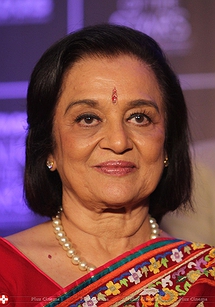به ازای هر نفری که با دعوت شما در منظوم ثبتنام میکنند 20 امتیاز میگیرید.
لینک دعوت:


Her fame gave her enough leverage to get producers to hire her mother Sudha Parekh to design her costumes for most of the films that she starred in. A fallacy that surrounded her was that she was generally considered a glamorous dancer/tomboy and not a serious actress until director Raj Khosla cast her in the tragedienne role in the hit film _Do Badan(1966)_. The truth was directors and audiences knew early on that she had genuine acting talent. She won the Gujarat State Award for Best Actress for her first Gujarati film "Akhand Saubhagyavati". And she easily compensated for non-actors like Joy Mukherjee and Biswajit, while holding her own against acting giants like Ashok Kumar.
Important directors were casting her and repeating her in their films, but Asha also brought out jealousies from her female co-stars. Simi Garewal claimed that Asha tried to cut her part down in "Do Badan", but Asha insisted that she never did that, and as proof, she showed that Simi won the Filmfare Award as Best Supporting Actress for the film. The "Do Badan" team also stood by Asha, especially the director Raj Khosla who later cast her in three more films. Her leading man Manoj Kumar soon directed and starred opposite her in his blockbuster "Upkar", which also won the Filmfare Best Picture Award.
Although Asha earned the title "Jubilee Girl" because of the continuous string of box office successes, such as "Ziddi", "Shikar", "Aan Milo Sajna", she also hit a rare bump with Raj Khosla's "Chirag". But she also earned her first Filmfare nomination as Best Actress for the film, and Khosla didn't blame her for the film's failure and in fact, cast her soon again and came up with a huge hit, "Mera Gaon Mera Desh". However, success brought controversy. Once again, a female co-star claimed that Asha cut her role down in the film. This time, Asha confronted Laxmi Chhaya directly and told her to think before she spoke as Padma got twice the number of songs than Asha did in "Mera Gaon Mera Desh". Aruna Irani allegedly said that Asha reduced her role in Nasir Hussain's box-office smash "Caravan", but facts back up Asha that she would never cut another performer's role, as Aruna had more songs than Asha, and she received a Filmfare nomination, while Asha wasn't nominated for the film at all. However, Asha did win the much coveted Best Actress Filmfare Award for Shakti Samanta's "Kati Patang". She played a deglamourised woman in a white sari pretending to be a widow whose vulnerable smile hides a painful past. Asha was thrilled when she won the award, but Mumtaz, her box-office rival and former co-star from "Mere Sanam" and "Bhai Bhai", complained that she was more deserving for her own performance in "Tere Mere Sapne".
Asha was hitting the heights of fame and glory even though she was now 30, an age where heroines normally would pack it in. But her passion for dancing sent her abroad on a extended trip to do dance shows and as a result, turned down important film roles. When she came back in 1973, she found that a younger and bolder breed of heroines like Hema Malini and Zeenat Aman got those roles and now ruled the roost. Asha focused on her distribution concern which she had started with Nasir Hussain when he directed her in the film "Baharon Ke Sapne" and would continue to do so for twenty more films. She also threw herself in her charity work, even having a Santa Cruz hospital named after her. She lived with her parents in her beautiful seaside bungalow, whose innovative design drew a lot of attention. Asha's passion with dance continued and her performance of famous dance ballets like "Chauladevi" won her acclaim. She did supporting roles in films, garnering Filmfare nominations as Best Supporting Actress for "Udhar Ka Sindur" and Raj Khosla's massive hit, "Main Tulsi Tere Aangan Ki", which also won the Filmfare Award as Best Film. But the rest of her supporting roles as mother and bhabhi (sister-in-law) disenchanted her, with the exception of her strong performances in "Hathyar" and the Gujarati film "Kulvadhu". And her back problems forced her to give up doing dance shows.
But she found a new passion, directing television serials such as the hugely popular Kora Kogaz in the early 90's, which convinced her to give up acting permanently in 1995. She formed her production company "Akruti," through which she produced and directed television serials. However, her acting accomplishments were not forgotten as she received the Filmfare Lifetime Achievement Award in 2002. After her mother's death, she sold her huge bungalow and moved into a smaller place to take care of her ailing father until he, too, passed away. She has never married and has not had any affairs with her many heroes, claiming that her reputation of being unapproachable probably intimidated men. In her 2017 memoir "The Hit Girl" (co-written by Khalid Mohamed) she confirmed that her longtime director Nasir Hussain was the "only one and true love of my life." Since he was already married with two children, she couldn't marry him without wrecking havoc on both their families. Their relationship eventually ended. His wife died in 2001, but Asha didn't try to marry the widowed Husain, since "he had become a shadow of his former self." He died just a year later in 2002. Asha continues to remain in touch with his children, grandson Imran Khan and nephew Aamir Khan. Now, Asha devotes all her time to her hospital and other humanitarian efforts. She also has set up a dance academy "Kara Bhavan," which has produced many skilled and talented dancers. For several years, she served as a judge on several talent shows on television. Today, Asha says that she is very flattered to know that she has fans all over the world.